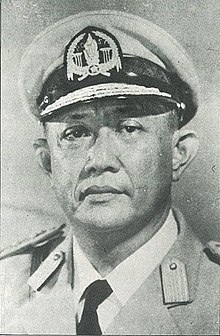Soekarno Djojonagoro
Lieutenant General Police (Commissioner General Police) (Ret.) Soekarno Djojonagoro (Born in Banjarnegara, Central Java, 15 May 1908, died in Jakarta, 27 November 1975) was the second Chief of the Indonesian National Police (Kapolri) (formerly the Head of State Police) from 15 December 1959 to 29 December 1963.
Soekarno Djojonagoro | |
|---|---|
 | |
| 2nd Chief of National Police of Indonesia | |
| In office 15 December 1959 – 29 December 1963 | |
| Preceded by | Said Soekanto Tjokrodiatmodjo |
| Succeeded by | Soetjipto Danoekoesoemo |
| Personal details | |
| Born | 15 May 1908 Banjarnegara, East Java, Dutch East Indies |
| Died | 27 November 1975 (aged 67) Jakarta, Indonesia |
| Spouse(s) | R.A. Soekatinah (wife) |
| Relations | R. Adipati Djojonagoro II (father) |
| Alma mater | OSVIA |
| Military service | |
| Allegiance | |
| Branch/service | |
| Years of service | 1928 - 1966 |
| Rank | |
Soekarno Djojonagoro is the fourth son of the Banjarnegara Regentm Raden Adipati Djojonagoro
Career
His police career began in 1928, after he completed his education at OSVIA. His first position was AIB at Jatibarang. He later became a Jepara and Rembang Resident Police Assistant (1931), Banyumas District Officer Assistant Banyumas (1934), Resident Assistant Lampung (1935), Kedungwuni Police Assistant, Pekalongan (1936), Police Officer Assistant Tegal (1941), Head of Section IV of Semarang City Police (1942), Chief of Salatiga Police (1943), Chief of Special Police Semarang City (1944), Semarang City Keibikatyo (1944), Kendal Police Chief (1945), General Head of Semarang Police Station (1945), Pekalongan Residency Police Chief (February 1950), Surabaya Residency Police Chief (August 1950), East Java Provincial Police Chief (December 1950), and Adjunct Chief of State Police (November 1959).
On 15 December 1959, Djojonegoro was appointed as Chief of the National Police replacing Raden Said Soekanto Tjokrodiatmodjo.
Several events during his time as Chief of the State Police:
- 1960 - National Police joined in ABRI
- 1 July 1960 - four pledges of police officers, "Catur Prasetya" pledged
- April 1961 - Catur Prasetya is officially used as a guideline for the Indonesian police in addition to Tribrata as a way of life
- 1962 - The National Police of the Republic of Indonesia changes its name to the Indonesian Police Force (AKRI).
His leadership period was marked by West Irian conflicts with the Netherlands and rebellions carried out by PKI, DI/TII, APRA and others, but they were handled well.
End of life
He was replaced by Lieutenant Colonel Police (Adjunct Senior Commissioner of Police) Soetjipto Danoekoesoemo on 30 December 1963 and was immediately appointed as the Minister of Advisor for the President for Internal Affairs. Djojonegoro entered retirement starting 31 July 1966. He enjoyed his days gathering with family.
Djojonagoro died at Dr. Cipto Mangunkusumo Hospital, Jakarta. He left his wife, R.A. Sukatinah, and five children. As per his request, his body was buried in a special tomb for the funeral of the Djojonagoro family, "Kuwondo Giri" in Banjarnegara.
External links
- (in Indonesian) Biografi Soekarno Djojonegoro pada situs web komisikepolisianindonesia.com
- (in Indonesian) Biografi di situs web kepustakaan-presiden.pnri.go.id